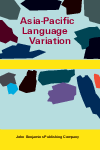
Asia-Pacific Language Variation
Scope & Guideline
Connecting Scholars Through the Lens of Language Variation
Introduction
Aims and Scopes
- Sociolinguistic Variation:
The journal emphasizes the study of sociolinguistic variation, examining how language varies across different social contexts, including factors such as ethnicity, gender, and social class. - Language Contact and Change:
A core area of focus is the impact of language contact, especially in multilingual settings, and how this leads to language change, including the formation of creoles and the influence of migration. - Phonological Studies:
The journal publishes research on phonological variation and change, investigating sound systems in various languages and dialects, and how they are affected by social and environmental factors. - Cultural Linguistics:
There is a consistent emphasis on the relationship between language and culture, including how language reflects cultural practices and ideologies within diverse communities. - Child Language Development:
Research on language use in children, especially in relation to sociolinguistic factors such as honorifics and speech directed at children, is a notable area of exploration. - Regional Linguistic Studies:
The journal highlights studies focused on specific regional languages and dialects, providing insights into their unique characteristics and variations.
Trending and Emerging
- Mobility and Migration Effects:
There is a growing focus on the effects of mobility and migration on language variation, particularly how immigrant communities influence and transform local linguistic landscapes. - Intersection of Identity and Language:
Research exploring the intersection of identity politics and language use is on the rise, emphasizing how language reflects and shapes social identities within diverse communities. - Phonetic Variation Studies:
An increase in phonetic variation studies is evident, with a particular interest in how factors such as gender, age, and social context influence phonetic outcomes. - Language and Social Media:
Emerging themes include the impact of social media on language use and variation, reflecting contemporary communication trends among younger populations. - Cognitive and Agentive Perspectives:
There is an increasing interest in cognitive approaches to language variation, examining how cognitive processes influence language use and how individuals navigate their linguistic environments.
Declining or Waning
- Standard Language Ideology:
There has been a noticeable decrease in papers explicitly addressing standard language ideologies and their implications, suggesting a shift towards more localized and emergent forms of language use. - Historical Linguistics:
Research that delves into historical linguistic changes over extended time periods seems to be less frequent, indicating a possible waning interest in diachronic studies in favor of synchronic analyses. - Language Endangerment Studies:
Though still relevant, the frequency of studies specifically focused on language endangerment and revitalization efforts appears to be diminishing, possibly overshadowed by more immediate sociolinguistic concerns. - Quantitative Methods in Linguistics:
There seems to be a decline in the use of traditional quantitative methodologies in favor of qualitative approaches, reflecting a broader trend in sociolinguistics.
Similar Journals

Italian Journal of Linguistics
Exploring the intricacies of language and theory.Italian Journal of Linguistics is a prominent academic journal published by PACINI EDITORE, dedicated to advancing the understanding of linguistic theory and application. With its inception in 1996, the journal has fostered scholarly discourse and continues to contribute to the field through rigorous peer-reviewed articles. Operating under the prestigious field of linguistics, the journal currently holds a respectable Q3 quartile ranking as of 2023, showcasing its relevance in the academic community. It also ranks in the top 30% of journals in both Arts and Humanities and Social Sciences disciplines, reflecting its impactful contributions documented in Scopus rankings. While the Italian Journal of Linguistics is not an open-access journal, it offers invaluable insights and innovative research findings, making it an essential resource for researchers, professionals, and students keen on exploring the nuances of language and linguistics. Based in Pisa, Italy, the journal serves as a significant platform for both contemporary studies and classic investigations in linguistics, appealing to an international audience devoted to this ever-evolving field.
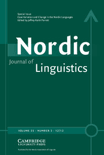
Nordic Journal of Linguistics
Unveiling the complexities of language through rigorous scholarship.Nordic Journal of Linguistics, published by Cambridge University Press, serves as a prominent platform for the dissemination of cutting-edge research in the field of linguistics. Established in 1978 and spanning over four decades, the journal has curated a rich repository of scholarly work that reflects the dynamic and evolving nature of language studies. With an impressive Q2 ranking in both the Linguistics and Language category and a commendable performance in Scopus rankings, placing it at the 74th percentile among Arts and Humanities, the journal is recognized for its high academic standards and impact on contemporary linguistic research. Scholars and practitioners can access a variety of studies that delve into different languages, linguistic theories, and methodologies, fostering broader understanding and dialogue within the linguistic community. Although the journal does not currently offer open-access options, it remains an invaluable resource for researchers, professionals, and students keen on advancing their knowledge of language and linguistics.
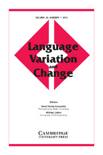
Language Variation and Change
Connecting Scholars Through Language VariationWelcome to Language Variation and Change, a prestigious journal published by Cambridge University Press and dedicated to the rigorous exploration of linguistic diversity and its evolution. With an ISSN of 0954-3945 and an E-ISSN of 1469-8021, this journal has been a pivotal platform for scholars since its inception in 1989, continuing to publish cutting-edge research up to 2024. Language Variation and Change is recognized in the top quartile for Linguistics and Language (Q1) and holds an impressive Q2 ranking in Education for 2023, underscoring its significant contribution to these fields. Its strong Scopus rankings—placing it in the 86th percentile for Arts and Humanities in Language and Linguistics—highlight its impact and quality. This journal aims to foster a deeper understanding of the dynamic interplay between language and society, making it essential reading for researchers, professionals, and students eager to engage with the latest findings and theoretical discussions in the arena of sociolinguistics. Stay connected with the evolving landscape of language studies through Language Variation and Change.
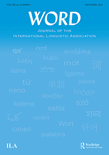
WORD-JOURNAL OF THE INTERNATIONAL LINGUISTIC ASSOCIATION
Championing high-quality research to inspire linguistic innovation.WORD-JOURNAL OF THE INTERNATIONAL LINGUISTIC ASSOCIATION is a leading peer-reviewed journal dedicated to advancing the field of linguistics and language studies. Published by Routledge Journals, Taylor & Francis Ltd, this esteemed journal has earned a reputation for its rigorous scholarship, reflected in its 2023 Q2 ranking in Linguistics and Language and its solid performance in Scopus Ranks. Encompassing a wide range of topics—from theoretical frameworks to empirical research—WORD serves as an essential resource for linguistics researchers, educators, and students alike. While currently not operating under an open access model, the journal is committed to providing high-quality, impactful research articles that contribute significantly to the linguistic community. With its convergence periods from 1998 to 2009 and 2015 to 2024, WORD continuously fosters the discourse of language studies, ensuring that critical insights and discussions are accessible for ongoing academic exploration.
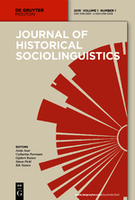
Journal of Historical Sociolinguistics
Bridging History and Sociolinguistics for Future InsightsThe Journal of Historical Sociolinguistics is a distinguished publication focusing on the intricate relationships between language and society from a historical perspective. Published by WALTER DE GRUYTER GMBH in Germany, this journal (ISSN: 2199-2894, E-ISSN: 2199-2908) is recognized for its rigorous scholarship, ranking in the Q2 quartile in Linguistics and Language (2023), highlighting its relevance and impact within the academic community. With Scopus rankings placing it at #326/1088 in Arts and Humanities and #386/1167 in Social Sciences, this journal is essential for researchers and scholars interested in the dynamics of language evolution, sociolinguistic shifts, and historical context. Through its insightful articles and contributions, the journal aims to illuminate the nuanced interplay between linguistic change and social factors over time, making it an invaluable resource for students, professionals, and academics alike. The journal operates under an open-access model, ensuring that knowledge is disseminated widely and freely accessible to those engaged in the cutting-edge studies of sociolinguistics.

Dialectologia
Catalyzing Conversations in Dialectology and BeyondDialectologia, published by the Universidad de Barcelona, Facultad de Filología, is a distinguished academic journal dedicated to the fields of linguistics and language studies. Since its inception in 2008, this Open Access journal has made significant strides in disseminating knowledge, fostering scholarly communication, and promoting research in dialectology and sociolinguistics. With its current classification in the Q3 quartile of linguistics and language, and Scopus rankings placing it in the 32nd and 29th percentiles within the Arts and Humanities and Social Sciences, respectively, Dialectologia plays a crucial role in advancing the study of language variation and change. The journal’s commitment to providing a platform for innovative research is underscored by its accessibility to a wide audience, ensuring that researchers, professionals, and students alike can engage with and contribute to contemporary discourse in language studies. Based in Barcelona, Spain, Dialectologia not only enriches academic literature but also connects a global community of language scholars through its compelling and diverse contributions.

Journal of Jewish Languages
Celebrating the Diversity of Jewish Linguistic ExpressionsThe Journal of Jewish Languages, published by BRILL, is a leading academic platform dedicated to the interdisciplinary study of Jewish languages, exploring their historical, cultural, and linguistic dimensions. With an ISSN of 2213-4387 and an E-ISSN of 2213-4638, this journal serves as a vital resource for researchers and students, offering insights into the evolution and significance of Jewish linguistic traditions from 2015 to 2024. As a Q3-ranked journal in the fields of Cultural Studies and History, and a Q4 ranking in Linguistics and Language, it presents a diverse array of scholarly articles that contribute to the understanding of Jewish languages in various cultural contexts. With commendable Scopus rankings that place it within the 60th to 75th percentile across multiple categories in Arts, Humanities, and Social Sciences, the Journal of Jewish Languages continues to be a pivotal venue for innovative research and dialogue. While the journal is not open access, it nonetheless remains an essential reading for anyone vested in the linguistics and cultural aspects of Judaism.
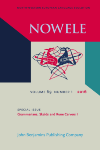
NOWELE-North-Western European Language Evolution
Unveiling the Rich Tapestry of Linguistic ChangeNOWELE-North-Western European Language Evolution, published by John Benjamins Publishing Co, serves as a vital platform for researchers and scholars interested in the evolution and dynamics of North-Western European languages. With an ISSN of 0108-8416 and an E-ISSN of 2212-9715, this journal has been contributing to the field of linguistics since its inception in 1983, with ongoing publications until 2024. Indexed in Scopus and classified in the Q3 category for Linguistics and Language, NOWELE is recognized for its rigorous academic standards and diverse contributions, ranking #485 out of 1088 in the Arts and Humanities category, and #566 out of 1167 in Social Sciences. The journal fosters an open dialogue within the linguistic community, presenting innovative research findings and theoretical advancements. Researchers, professionals, and students alike benefit from its systematic exploration of language evolution in the context of a rapidly changing global linguistic landscape.

Cuadernos de Linguistica Hispanica
Connecting Scholars Through Open Access Linguistic ResearchCuadernos de Linguistica Hispanica is a distinguished open access journal published by UNIV PEDAGOGICA & TECNOLOGICA COLOMBIA, dedicated to advancing research in the field of linguistics and language studies since its inception. With an ISSN of 0121-053X and E-ISSN 2346-1829, this journal has established itself as an important platform for scholars to share innovative findings and insights within the linguistics community. As a Q3-ranked journal in linguistics and language according to 2023 category quartiles, it occupies a significant position in Scopus rankings, showcasing its commitment to quality and relevance. With the aim to foster scholarly discourse and promote understanding of the Hispanic linguistic landscape, the journal welcomes contributions that explore a diverse range of topics and methodologies. The journal has embraced open access since 2008, ensuring that research is accessible to a broader audience, thus enhancing its impact and engagement within both academic and professional spheres.
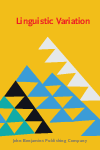
Linguistic Variation
Fostering Dialogue on Linguistic DiversityLinguistic Variation is a prestigious academic journal dedicated to advancing the field of linguistics and language studies. Published by John Benjamins Publishing Co, this journal provides a comprehensive platform for researchers, educators, and students to explore the rich diversity of linguistic practices and theories. With an ISSN of 2211-6834 and an E-ISSN of 2211-6842, it spans a crucial timeline from 2017 to 2024. Renowned for its rigorous peer-review process, Linguistic Variation holds Q2 status in Linguistics and Language and Q3 in Food Science within the 2023 category quartiles, reflecting its significant role in interdisciplinary research. The journal ranks #412 out of 1088 in Arts and Humanities and #489 out of 1167 in Social Sciences according to Scopus, indicating its growing influence and esteem in the academic community. Researchers will appreciate its focus on empirical studies and theoretical advancements while benefiting from a wide array of access options that cater to varied readership needs. As a vital resource in linguistics, it aims to foster critical dialogue and innovation within the discipline.